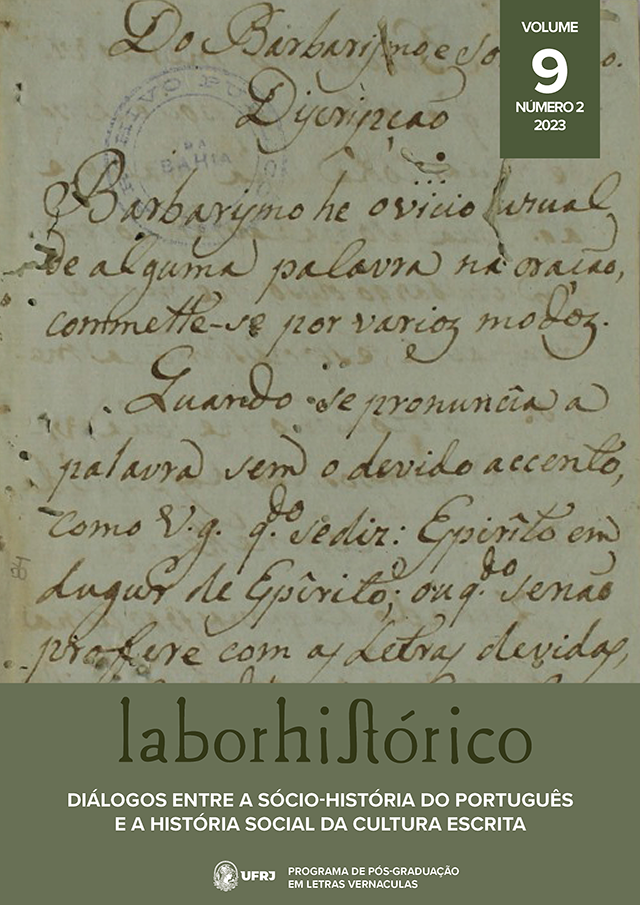Linguistic Contact and Portuguese-to-Spanish Document Translation During the Iberian Union
DOI:
https://doi.org/10.24206/lh.v9i2.55432Palavras-chave:
Linguistic Contact, Document Translation, Peninsular Union, Portuguese, Spanish.Resumo
The present paper discusses document translation and analyzes the translation from Portuguese to Spanish of a report of the Council of Portugal, which describes the political-administrative situation of the Moluccas Islands. The concepts of bilingualism and diglossia (FISHMAN, 1967) are used to discuss the colonial translation scenario, and the taxonomic framework provided by Barbosa (2004) supports the translation analysis. The main research tools are the selection and editing of manuscripts, and the classification of translation procedures. Results indicate the historical study of document translation between Portuguese and Spanish as a new research field, mainly involving contact between languages; the tendency towards literality as the main feature of Iberian Union (1580-1640) administrative translation, as these are technical documents; punctual translator interference, with instances of source-text omission and rewriting; and the possible comparison between document translation in Asian and American Portuguese colonies.
Downloads
Referências
ALONSO ROMO, E. J.. Português e castelhano no Brasil quinhentista à volta dos jesuítas. Revista de Indias, vol. LXV, núm. 234, p. 491-510, 2005. https://revistadeindias.revistas.csic.es/index.php/revistadeindias/article/view/394/463 (accessed 25 March, 2022).
BARBOSA, H. G.. Procedimentos técnicos de tradução. Pontes, 2004 (1990).
CÁCERES WÜRSIG, I.. Breve historia de la secretaría de interpretación de lenguas. Meta, vol. 49, n. 3, p. 609-628, 2004. https://doi.org/10.7202/009381ar
CASTRO, I.. Sur le bilinguisme littéraire castillan-portugais. Arquivos do Centro Cultural Calouste Gulbenkian, XLIV, p. 11‑23, 2002. http://www.cervantesvirtual.com/descargaPdf/la-litterature-dauteurs-portugais-en-langue-castillane/ (accessed 25 March, 2022).
DASILVA, X. M.. La traducción literaria entre español y portugués en los siglos XVI y XVII. E-Spania: Revue électronique d'études hispaniques médiévales, nº. 27, 2017. https://doi.org/10.4000/e-spania.26695
FERGUSON, C.. Diglossia. In: PAULSTON, C. B.; TUCKER, G. R. (Eds.). Sociolinguistics. Hoboken/Nova Jersey: Blackwell, 2003. p. 345-358.
FERNÁNDEZ-ORDÓÑEZ, I. Alfonso X el Sabio en la historia del español. (2004). In: CANO, R.. Historia de la lengua española. Barcelona: Ariel, 2004. p. 381-422.
FISHMAN, J. Bilingualism With and Without Diglossia, Diglossia With and Without Bilingualism. In: PAULSTON, C. B.; TUCKER, G. R. (Eds.). Sociolinguistics. Hoboken/Nova Jersey: Blackwell, 2003. p. 359-366.
GARCÍA MARTÍN, A. M. ¿Un castellano de Portugal? Algunas consideraciones sobre el empleo del castellano por autores portugueses de los siglos XVI y XVII. In : BESSE, M. G. (Coord.). Cultures lusophones et hispanophones. Toronto : Indigo & Côté-femmes Éditions, 2010. p. 199-209. https://www.filologiaportuguesa.es/docentes1.asp?cod=12&sec=2&page=&bus=&ini=&fil= (accessed 25 March, 2022).
GARCÍA MARTÍN, A. M. El bilingüismo luso-castellano en Portugal: estado de la cuestión. In: MARCOS DE DIOS, Á. (Ed.). Aula bilingüe. Madrid: Luso-Española de Ediciones, 2008. p. 15-44. https://www.filologiaportuguesa.es/aulaiberica/aula%20ib%C3%A9rica_ana%20mar%C3%ADa%20garc%C3%ADa%20mart%C3%ADn.pdf (accessed 25 March, 2022).
GAUGER, H-M. La conciencia lingüística en la Edad de Oro. In: CANO, R.. Historia de la lengua española. Barcelona: Ariel, 2004. p. 681-700.
KABATEK, J. Un nuevo capítulo en la lingüística histórica iberorrománica. In: KABATEK, J.; MORENO, C.B. (Eds.). Lingüística de corpus y lingüística histórica iberorrománica. Berlin: De Gruyter, 2016. p. 1-18. https://doi.org/10.1515/9783110462357-001
MARCUSCHI, L. A. Produção textual, análise de gêneros e compreensão. São Paulo: Parábola, 2008.
MOREIRA, F. A.. Notas sobre a convivência de línguas em Portugal no século XV e a tradução da Crónica de Alfonso X. E-Spania: Revue électronique d'études hispaniques médiévales, nº. 13, 2012. https://doi.org/10.4000/e-spania.21113
PÉREZ-ABADÍN BARRO, S.. Tareas pendientes: la poesía hispano-lusa de los siglos XVI y XVII. Edad de oro, vol. 30, 257-296, 2011.
https://www.cervantesvirtual.com/nd/ark:/59851/bmc0928923 (accessed 25 March, 2022).
PÉREZ-ABADÍN BARRO, S.; BLANCO GONZÁLEZ, M.. Textos y autores luso-castellanos de los siglos XVI y XVII. Criticón, nº. 134, 5-34, 2018. https://doi.org/10.4000/criticon.4823
PROCÓPIO, E.; MOTA, F. P. A Tradução de Documentos Relativos ao Brasil Conservados nos Arquivos Públicos Espanhóis (XVI-XIX). Revista Philologus, v. 18, 38-58, 2012.
PROCÓPIO, E.; MOTA, F.P.. Code-Mixing na Documentação Colonial Portuguesa - Carta de Wybrant Warwyck (1604). Revista Papia, v. 26, 283-299, 2016.
SARMIENTO, R.; SÁNCHEZ, A.. Gramática básica del español. Madrid: SGEL, 1989.
SEGURADO E CAMPOS, J. A.. Bilinguismo Literário e Política da Língua no ‘Século de Camões’. DEDALUS – Revista Portuguesa de Literatura Comparada, nº 20, 161-174, 2016. http://www.aplc.org.pt/index.php/2-uncategorised/128-bilinguismo-literario-e-politica-da-lingua-no-seculo-de-camoes (accessed 25 March, 2022).
TRAVAGLIA, N. G.. Tradução retextualização: a tradução numa perspectiva textual. Uberlândia: EDUFU, 2003.
GARCÍA YEBRA, V.. Traducción: historia y teoría. Madrid: Gredos, 1994.
Downloads
Publicado
Edição
Seção
Licença
Os autores que publicam nesta revista concordam com o seguinte:
a. Os autores detêm os direitos autorais dos artigos publicados; os autores são os únicos responsáveis pelo conteúdo dos trabalhos publicados; o trabalho publicado está licenciado sob uma Licença Creative Commons Atribuição-NãoComercial 4.0 Internacional, que permite o compartilhamento da publicação desde que haja o reconhecimento de autoria e da publicação pela Revista LaborHistórico.
b. Em caso de uma segunda publicação, é obrigatório reconhecer a primeira publicação da Revista LaborHistórico.
c. Os autores podem publicar e distribuir seus trabalhos (por exemplo, em repositórios institucionais, sites e perfis pessoais) a qualquer momento, após o processo editorial da Revista LaborHistórico.


